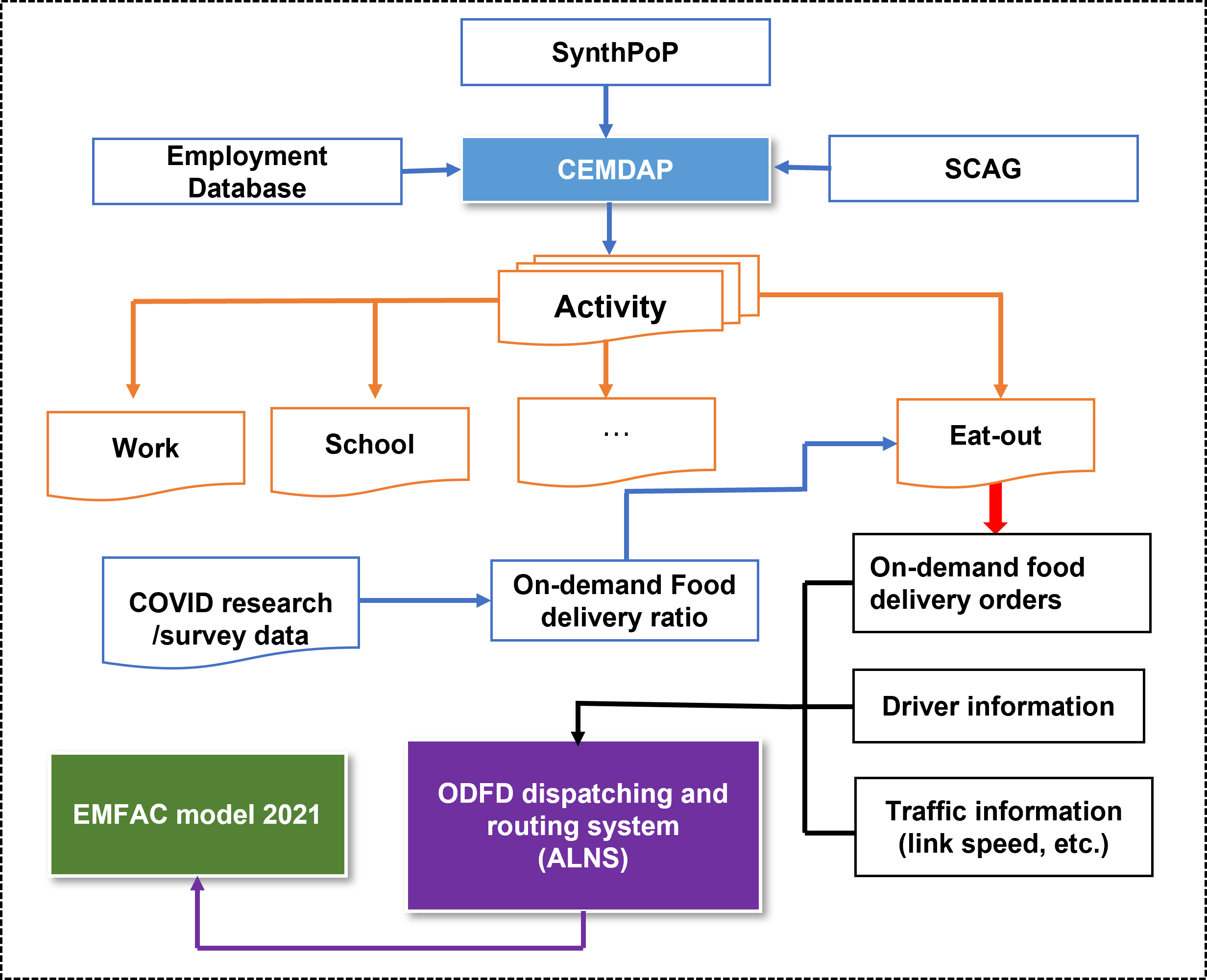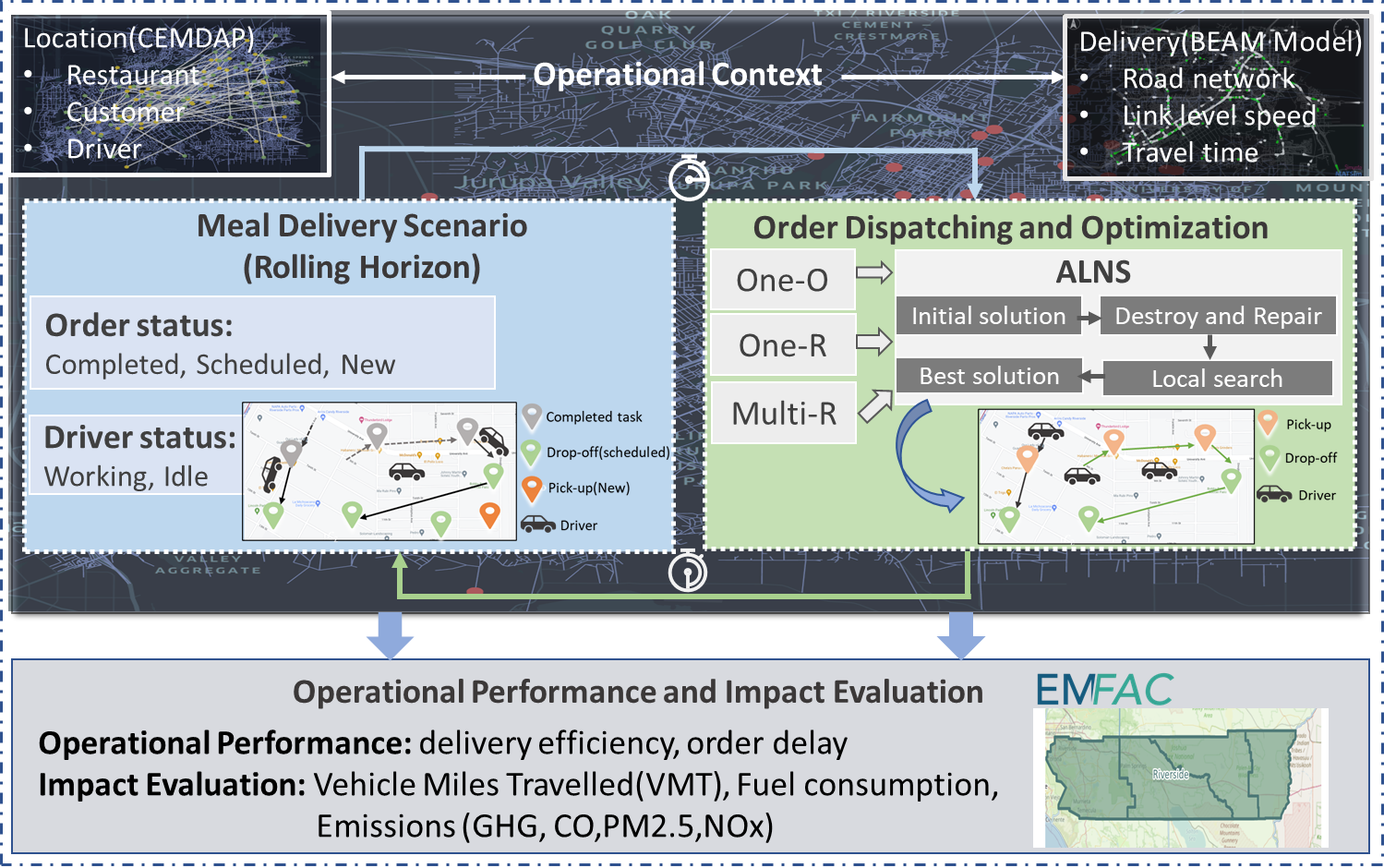Researsh
Model-Based Vehicle-Miles Traveled and Emission Evaluation of On-Demand Food Delivery Considering the Impact of COVID-19 Pandemic
Haishan Liu , Peng Hao, Yejia Liao, Kanok Boriboonsomsin, Matthew J. Barth
Published at Transportation Research Record, 2023 and presented at TRB 2023
[Paper]
Abstract
The market for on-demand food delivery (ODFD) has increased considerably, especially during the COVID-19 pandemic. It is crucial for transportation and environmental agencies to understand how ODFD has reshaped the travel patterns of people, affecting vehicle-miles traveled (VMT) as well as pollutant emissions in the transportation system. However, the lack of public data from food delivery companies makes it challenging to quantify the impact of on-demand delivery on the real-world transportation network. In this research, we propose a comprehensive framework to quantify the VMT and emissions incurred by ODFD with three main components: (i) a daily activity generation tool, Comprehensive Econometric Micro-simulator for Daily Activity-travel Patterns, to create a simulation scenario of ODFD behaviors based on a real-world roadway network and population demographics in the City of Riverside, California; (ii) an efficient order dispatching and routing algorithm, adaptive large neighborhood search, to obtain a high quality order dispatching and routing plan; (iii) an emission evaluation model, emission factor (EMFAC), to evaluate pollutant emissions from all dining-related trips. Both short-term and long-term impacts of the COVID-19 pandemic are evaluated. Experimental results show that ODFD has great potential to reduce the dining-related VMT and emissions. The total dining-related VMT in the during-pandemic case decreased by 38% and in the after-pandemic case reduced by 6% to 9%, and the corresponding environmental impacts were reduced accordingly. Meanwhile, emissions reduced significantly with more electric vehicles involved in food delivery. With 100% electric delivery fleet, the ODFD service can save 14% to 22% of emissions after the COVID-19 pandemic.
Evaluating the Order Dispatching Strategies for a Dynamic On-Demand Meal Delivery System—A Case Study in the City of Riverside
Haishan Liu , Yejia Liao, Peng Hao, Kanok Boriboonsomsin, Matthew J. Barth
Accepted by International Conference on Transportation and Development 2023
[Paper]
Abstract
The prevalence of information and communication technologies has catalyzed the emergent on-demand meal delivery (ODMD) service. Order dispatching policies play a crucial role in determining the operational performance and environmental impact of ODMD system. In this paper, the authors proposed a comprehensive framework to evaluate meal delivery efficiency and quantify the corresponding environmental impact of ODMD system under different order dispatching policies. It consists of three components: (1) the real-world meal delivery operational context that is generated to simulate daily activities and travel patterns in the city of Riverside and construct the on-demand meal delivery scenarios; (2) an efficient optimization approach: rolling horizon-based adaptive large neighborhood search algorithm, to obtain order dispatching and routing decisions with the dynamic order demand and driver resources; and (3) an energy consumption and emission evaluation model developed via EMFAC to quantify the corresponding fuel consumption and pollutant emissions. With the proposed framework, three order dispatching policies are evaluated: One-Order-Per-Trip (One-O), One-Restaurant-Per-Trip (One-R), and Multi-Restaurant-Per-Trip (Multi-R). Simulation results show substantial benefits of having orders bundled in the One-R and Multi-R policies. The total travel distance is reduced by 14% and 30%, respectively, compared to the One-O policy. Meanwhile, the total number of delivery drivers is reduced by 36% and 60%, which shows great potential to relieve the urban traffic burdens, together with 14%–30% fuel consumption, GHG emissions, and criteria pollutant emissions reductions. Meanwhile, the service quality is maintained with only 1% of late orders.


